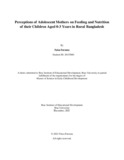| dc.contributor.advisor | Mehnaz, Ashfi | |
| dc.contributor.author | Farzana, Faiza | |
| dc.date.accessioned | 2022-02-24T04:52:02Z | |
| dc.date.available | 2022-02-24T04:52:02Z | |
| dc.date.copyright | 2021 | |
| dc.date.issued | 2021-12 | |
| dc.identifier.other | ID 20155001 | |
| dc.identifier.uri | http://hdl.handle.net/10361/16335 | |
| dc.description | This thesis is submitted in partial fulfilment of the requirements for the degree of Masters of Science in Early Child Development, 2021. | en_US |
| dc.description | Cataloged from PDF version of thesis. | |
| dc.description | Includes bibliographical references (pages 45-61). | |
| dc.description.abstract | Proper feeding practices of newborn and young children are the key to improve child overall health
and to achieve developmental milestones. In Bangladesh, a large portion of young rural girls have
ended up becoming mothers before the age of 18. From past records it has been seen that most
interventions which are designed to improve infant and young child feeding practices have mostly
targeted older mothers. That is why, this study has been designed with an aim to explore the
perceptions and practices of infant and young children feeding among adolescent mothers aged
less than 19 years old in rural Bangladesh. For this study, data was collected through in-depth
interviews and group discussions with a total of twelve adolescent mothers who are less than 19
years old and have children aged 0-3 years old. Data has revealed that majority of the mothers hold
very limited knowledge on nutrition as well as child nutrition. Among them, who are educationally
a bit ahead hold a little better knowledge on those issues. All the participants are aware of
exclusively breastfeeding for up to 6 months, though they all misinterpret the term ‘exclusive
breastfeeding’ with other liquid food. From the data it has also emerged that most of the mothers
recognize the ideal timing of starting complementary feeding but very few of them actually
understand what to feed children in regular basis. In spite of having misconception and superstation
rural adolescent mothers’ practice responsive feeding instead of force feeding. No gender
discrimination has found regarding child feeding in mothers’ responses. Findings of the study
pinpointed that mothers are unable to practice proper infant and child feeding due to lack of
knowledge and limited affordability. Educating young girls & young mothers and improving
financial security could be an effective way to promote improved infant feeding practices. | en_US |
| dc.description.statementofresponsibility | Faiza Farzana | |
| dc.format.extent | 75 pages | |
| dc.language.iso | en | en_US |
| dc.publisher | Brac University | en_US |
| dc.rights | BRAC University thesis reports are protected by copyright. They may be viewed from this source for any purpose, but reproduction or distribution in any format is prohibited without written permission. | |
| dc.subject | Adolescent mothers’ perception | en_US |
| dc.subject | Infant and young child feeding | en_US |
| dc.subject | Rural Bangladesh | en_US |
| dc.subject.lcsh | Mother and child. | |
| dc.title | Perceptions of adolescent mothers on feeding and nutrition of their children aged 0-3 years in rural Bangladesh | en_US |
| dc.type | Thesis | en_US |
| dc.contributor.department | Institute of Education Development, BRAC University | |
| dc.description.degree | M. Early Child Development | |

